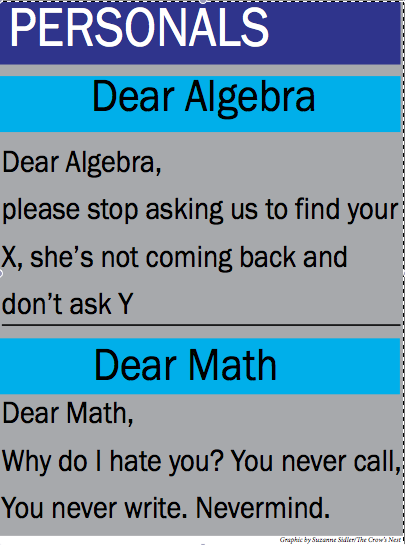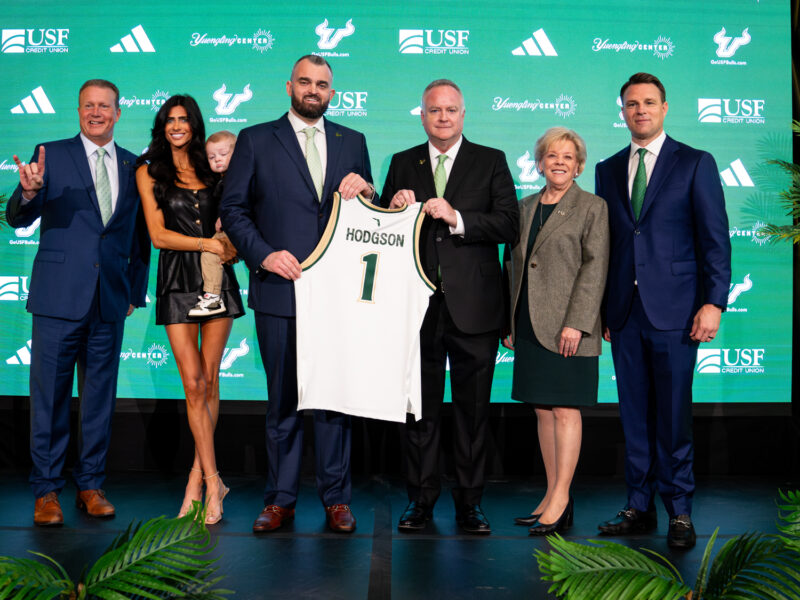 Lacking an official math department, students and faculty are working to enhance teaching styles and increase passing rates
Lacking an official math department, students and faculty are working to enhance teaching styles and increase passing rates
It took Caitlin Greene, a senior majoring in marketing, five attempts to pass two USF St. Petersburg math courses # three at college algebra and two at business calculus. The struggle set her back a year in school and delayed her entry into the College of Business.
“I am the first person to tell someone struggling with classes that no matter how terrible the professor is, sometimes you just have to teach yourself,” Greene said. She spent up to three days a week in the academic success center, searched for sample problems and videos online and completed her MyMathLab online coursework.
A student studying up to 12 credit hours per semester is recommended to study an additional 24 to 36 hours per week, granting two to three hours minimum per class. According to Kathleen Gibson, Quality Enhancement Plan co-director for math education, the transition to college courses is difficult for freshmen.
“We see a lot of students coming in and even though they may have had precalculus or something similar in high school, what they learned was how to do problems by rote (repetition). The teachers showed them how to do a problem and then they would go and do it again,” Gibson said. “When you come to college, you’re coming in to learn higher levels of thinking.”
The Quality Enhancement Plan, a five-year program developed by USFSP mathematics professors, addresses the concerns of students and faculty for general education passing rates.
USFSP does not have a mathematics department. Therefore, math professors have no director to look for leadership. Instead, math professors search for adjunct and full-time colleagues by conducting interviews as a committee, essentially hiring themselves.
In 2008, professors began conducting diagnostic tests with students to address the rising numbers of D’s, F’s and incomplete grades in College Algebra. The tests revealed students’ struggle to adapt to university teaching techniques. In a year, the study revealed that courses with frequent quizzes and homework opportunities had higher passing rates.
Students like Tessa Owens, a sophomore majoring in biology, cite MyMathLab as a difficult system for virtual participation in math courses. The sample questions were unclear for her as she attempted her homework.
“I would find myself just guessing many times and luckily getting the answer after a few attempts, or I would just use the example given and plug in my own numbers so I wouldn’t have to do the work myself,” Owens said.
Diagnostic tests, recommended by many general education mathematics professors, help place students into courses they may be better prepared for. Math 1033, an intermediate algebra course for elective credit, was added to course options to provide an opportunity to sharpen mathematics skills and prepare students to rely on becoming “an adult thinker,” Gibson explained.
“Once you get your degree and you’re out in the work world, you’re going to be expected to be up [higher],” Gibson said. Mathematics professors focus on a three-step system to guarantee student success with a “jam” session of practice problems on whiteboards, a “quest” of 10 questions as neither a quiz or test and a “request” to allow students to test their skills once more.
Since implementing changes with Quality Enhancement Plan, up to 74 percent of students enrolled in general education mathematics courses pass their courses. Gibson is structuring a relationship and continuing dialogue between professor and pupil.
Mark Lombardi-Nelson, a senior studying entrepreneurship and USFSP’s student body president, credits his passage of precalculus to additional study time with professor Erika Asano.
“I don’t think I’ve used a teacher’s office hours more than I did for that class,” Lombardi-Nelson said.“If she would not have been so willing to sit with me and walk me through certain things, I would have probably had to take it again.”
news@crowsneststpete.com


